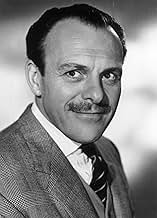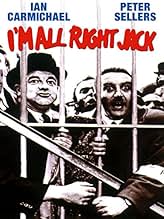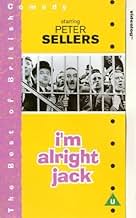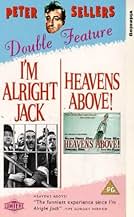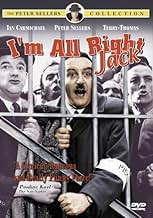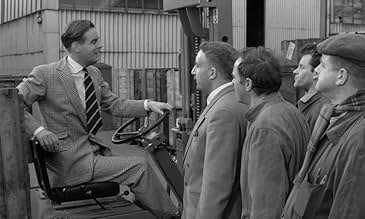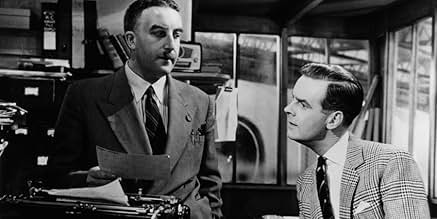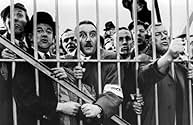AVALIAÇÃO DA IMDb
7,1/10
4,6 mil
SUA AVALIAÇÃO
Adicionar um enredo no seu idiomaA naive aristocrat in search of a career becomes caught up in the struggles between his profit-minded uncle and an aggressive labor union.A naive aristocrat in search of a career becomes caught up in the struggles between his profit-minded uncle and an aggressive labor union.A naive aristocrat in search of a career becomes caught up in the struggles between his profit-minded uncle and an aggressive labor union.
- Direção
- Roteiristas
- Artistas
- Ganhou 2 prêmios BAFTA
- 3 vitórias e 1 indicação no total
Dennis Price
- Bertram Tracepurcel
- (as Denis Price)
Avaliações em destaque
After the second world war is over, a new spirit of togetherness is fostered in the UK, and industry blossoms. Eager to get involved, the well-to-do Stanley Windrush tries to get a management job but fails. However some friends of the family, head of industry types get him a job with the workers at a missile factory. However his enthusiasm gets him in trouble with the all-powerful unions but is that what the bosses planned for all along?
First of all I cannot believe that this film has so few votes and comments (at time of writing this it's 270 and 5 respectively). I know this doesn't correlate with the number of users who have seen the film but it is a fair representation! I find that shocking, as this is one of the stronger satires I've seen for a good long while. The plot is a sort of comedy ploy by the bosses to shift work around to other firms (by relying on their own firm striking) and get personally rich as a result, however it is the satirical edge that makes it worth watching. Both bosses and unions get it in the neck here neither coming off well in the wash!
Bosses are seen as profit driven and not looking at the greater good, workers on the other hand are seen as looking after themselves while the unions cause more problems than they solve! There is an element of truth in all this that's why it is funny although it is obviously laid on a bit strong in the name of comedy. As a current worker in the UK manufacturing industry (yes, there is some left although it's an American company!) I am greatly amused by the caricatures as some elements (happily less each year) of them can still be seen in my place of employment! The management get off quite light as they are actually, at core, trying to improve the business's efficiency and thus compete with foreign firms. The workers and the unions get the hardest stick which is a little unfair after all the workers make the least and are the ones at risk, while the unions have brought about great steps in workers rights. For example it was funny for me to see FLT's moving around in heavily pedestrianised areas nowadays many larger factories will be totally segregated between vehicles and workers.
The plot does manage to mix the swipes so that it seems fair on the surface it is a pretty damning dig at British industry and, from modern views, it is quite prophetic as British industry has really fallen in the past few decades. The `one out, all out' strike mentality is well spoofed here but there's no doubting the damage that it (with other factors) has had. The only downside of the film looking back, is the racist views and racist language that is used at a couple of moments but in fairness these are not THAT offensive and can be overlooked as the culture of the film at the time.
Despite the quite anti-union feel to the film, Sellers does well to not overplay his character. The socialist worker type is really easy to get laughs off but Sellers brings out character and doesn't just go for an out and out mockery of the character. Carmichael is OK in the lead but is overshadowed by the sheer depth of excellent support roles. Le Mesurier's excellent, twitchy efficiency expert, Thomas' manager sweating and terrified of the workers he calls `an absolute shower' in the way only he can say it! Further faces fall into the film in the distinguished shapes of Attenborough, Rutherford and Price to name a few.
Overall this film comes out as a very classy satire. It hits the nail on the head and, over 40 years later, much of it can still be seen today and the damage from the stuff it satirises is being felt. The film is funny if you have a passing understanding of British industry in terms of politics, workers rights and unions even without this understanding the central plot is broad enough and funny enough to be worth seeing!
First of all I cannot believe that this film has so few votes and comments (at time of writing this it's 270 and 5 respectively). I know this doesn't correlate with the number of users who have seen the film but it is a fair representation! I find that shocking, as this is one of the stronger satires I've seen for a good long while. The plot is a sort of comedy ploy by the bosses to shift work around to other firms (by relying on their own firm striking) and get personally rich as a result, however it is the satirical edge that makes it worth watching. Both bosses and unions get it in the neck here neither coming off well in the wash!
Bosses are seen as profit driven and not looking at the greater good, workers on the other hand are seen as looking after themselves while the unions cause more problems than they solve! There is an element of truth in all this that's why it is funny although it is obviously laid on a bit strong in the name of comedy. As a current worker in the UK manufacturing industry (yes, there is some left although it's an American company!) I am greatly amused by the caricatures as some elements (happily less each year) of them can still be seen in my place of employment! The management get off quite light as they are actually, at core, trying to improve the business's efficiency and thus compete with foreign firms. The workers and the unions get the hardest stick which is a little unfair after all the workers make the least and are the ones at risk, while the unions have brought about great steps in workers rights. For example it was funny for me to see FLT's moving around in heavily pedestrianised areas nowadays many larger factories will be totally segregated between vehicles and workers.
The plot does manage to mix the swipes so that it seems fair on the surface it is a pretty damning dig at British industry and, from modern views, it is quite prophetic as British industry has really fallen in the past few decades. The `one out, all out' strike mentality is well spoofed here but there's no doubting the damage that it (with other factors) has had. The only downside of the film looking back, is the racist views and racist language that is used at a couple of moments but in fairness these are not THAT offensive and can be overlooked as the culture of the film at the time.
Despite the quite anti-union feel to the film, Sellers does well to not overplay his character. The socialist worker type is really easy to get laughs off but Sellers brings out character and doesn't just go for an out and out mockery of the character. Carmichael is OK in the lead but is overshadowed by the sheer depth of excellent support roles. Le Mesurier's excellent, twitchy efficiency expert, Thomas' manager sweating and terrified of the workers he calls `an absolute shower' in the way only he can say it! Further faces fall into the film in the distinguished shapes of Attenborough, Rutherford and Price to name a few.
Overall this film comes out as a very classy satire. It hits the nail on the head and, over 40 years later, much of it can still be seen today and the damage from the stuff it satirises is being felt. The film is funny if you have a passing understanding of British industry in terms of politics, workers rights and unions even without this understanding the central plot is broad enough and funny enough to be worth seeing!
10mzinkin
For me, this is the best film of all time. A superb cast of the UK's finest character actors and an A1 script.
Peter Sellers was truly magnificent as the left wing union shop steward and Terry Thomas excelled in playing the two faced Personnel Manager. Among his classic comments are "The Management have behaved like absolute stinkers" when talking to the union and " They are a complete shower" when talking to Management about the unions. Another fine comment is when on being told that some bigwigs are visiting the factory, Terry Thomas replies "You better spruce the place up a bit, you know soap in the toilets, that sort of thing".
I must have seen this film at least 20 times and I never grow tired of it. Great story, fine comedy and great acting. Never has a film handled the issue of industrial relations in such an amusing and pertinent manner.
Peter Sellers was truly magnificent as the left wing union shop steward and Terry Thomas excelled in playing the two faced Personnel Manager. Among his classic comments are "The Management have behaved like absolute stinkers" when talking to the union and " They are a complete shower" when talking to Management about the unions. Another fine comment is when on being told that some bigwigs are visiting the factory, Terry Thomas replies "You better spruce the place up a bit, you know soap in the toilets, that sort of thing".
I must have seen this film at least 20 times and I never grow tired of it. Great story, fine comedy and great acting. Never has a film handled the issue of industrial relations in such an amusing and pertinent manner.
The cast alone is a triumph in this movie - some of the best British character actors who ever lived are here: Terry Thomas, Miles Malleson, John Le Mesurier, all backing up Ian Carmichael as the earnest, silly-ass upper-class bumbler and Peter Sellers as Fred Kite, the Marxist shop steward. Sellers in particular is wonderful; his Fred Kite is a lower class striver who has acquired just enough education to give him an inflated idea of his own abilities, but not enough to realize the gaps and inadequacies in his views. He is a perfect realization in miniature of Taine's statement that there is nothing more dangerous than a general idea in a narrow, empty mind. He boasts to his Oxford-educated gentleman lodger about the summer course he took at the university once, reminding him in a familiar fashion about the very good marmalade and toast provided by the college, while the obviously wealthy young man politely admits that he wasn't acquainted with the public dining hall during his years there.
The plot becomes more and more complex as the movie progresses, with almost everyone turning out to be on the take. The climax comes in a free-for-all over a bag containing thousands of pounds intended to bribe Stanley into joining the sensible schemers plundering the public while paying lip service to public service and solidarity with the working class. Malcolm Muggeridge has a interesting cameo in this scene, playing himself. Most recent broadcasts of this movie have edited out the disturbing racist statements of the working class characters, but the original movie had no sentimental soft spot for anyone, workers or bosses.
The plot becomes more and more complex as the movie progresses, with almost everyone turning out to be on the take. The climax comes in a free-for-all over a bag containing thousands of pounds intended to bribe Stanley into joining the sensible schemers plundering the public while paying lip service to public service and solidarity with the working class. Malcolm Muggeridge has a interesting cameo in this scene, playing himself. Most recent broadcasts of this movie have edited out the disturbing racist statements of the working class characters, but the original movie had no sentimental soft spot for anyone, workers or bosses.
10miloc
Along with Alexander Mackendrick's "The Man in the White Suit," this is THE great satire of management-labor relations: less allegorical and more cheerfully crass. In a way this movie seems like a sort of crossroads in British comedy, poised between the warmer eccentricities of the Ealing films and and the screw-'em-all pop irreverence of the rising New Wave.
These days the film seems to be primarily remembered for Peter Sellers' magnificent caricature of socialist sanctimony, Fred Kite, but the whole gallery of players, many reprising roles from the earlier "Private's Progress," is excellent. Carmichael, all inane, wild-eyed grins, is Woosterish as ever as the brainless but well-intentioned Windrush. Terry-Thomas produces a very funny sketch of middle-class middle management. It's a perfect picture of lazy hypocrisy: the man who settles into a do-nothing job, knowing exactly how awful it is but not caring so long as he gets through the day. He had a face made for contempt; watching his mustache curl as he reads an entry in the workers' suggestion box ("Filthy beast," he mutters, as he tucks it away in a pocket) or as he picks his way through the rubbish of Kite's wifeless home is a joy. Price and Attenborough are, as always, first-class rotters, the iciest of the moneyed class, and Handl, Le Mesurier and Rutherford add vividly funny moments. As the war over Windrush expands from workplace to societal to domestic spheres, watching the various characters bounce and interact provides some of the movie's best-observed moments, such as the brief tea scene between Rutherford and Handl, who, though inhabiting utterly different worlds, seem to interact perfectly in mutual obliviousness.
And there is Sellers, of course, pitch-perfect whether marching around the factory like the lead float in a parade or rhapsodizing about Russia or going hilariously blank on live television. It's memorable work that might overbalance the movie's double-edged attack if it weren't human enough to be sympathetic as well.
All in all, silly, clever, raucous fun.
These days the film seems to be primarily remembered for Peter Sellers' magnificent caricature of socialist sanctimony, Fred Kite, but the whole gallery of players, many reprising roles from the earlier "Private's Progress," is excellent. Carmichael, all inane, wild-eyed grins, is Woosterish as ever as the brainless but well-intentioned Windrush. Terry-Thomas produces a very funny sketch of middle-class middle management. It's a perfect picture of lazy hypocrisy: the man who settles into a do-nothing job, knowing exactly how awful it is but not caring so long as he gets through the day. He had a face made for contempt; watching his mustache curl as he reads an entry in the workers' suggestion box ("Filthy beast," he mutters, as he tucks it away in a pocket) or as he picks his way through the rubbish of Kite's wifeless home is a joy. Price and Attenborough are, as always, first-class rotters, the iciest of the moneyed class, and Handl, Le Mesurier and Rutherford add vividly funny moments. As the war over Windrush expands from workplace to societal to domestic spheres, watching the various characters bounce and interact provides some of the movie's best-observed moments, such as the brief tea scene between Rutherford and Handl, who, though inhabiting utterly different worlds, seem to interact perfectly in mutual obliviousness.
And there is Sellers, of course, pitch-perfect whether marching around the factory like the lead float in a parade or rhapsodizing about Russia or going hilariously blank on live television. It's memorable work that might overbalance the movie's double-edged attack if it weren't human enough to be sympathetic as well.
All in all, silly, clever, raucous fun.
I was quite surprised with this film, not because of liking it (I did), but just how much union politics the Boulting Brothers put on their sleeve with working on this movie. I have been in a Union business that failed before, and I was quite shocked at how much I could compare my own experiences with what was on display here with the Unions and Management trying to maneuver themselves ahead of on another. While Peter Sellers does put on a great performance, this really is Ian Carmichael's movie. I hadn't seen any of his work, and this was a great introduction. All of the other cast is great as well. One final note, it probably contains the most annoyingly catchy title song ever, it'll probably haunt your cranium for days.
Você sabia?
- CuriosidadesThe machines in the Num Yum factory are a spoof on the Moloch scenes from Fritz Lang's film Metropolis.
- Erros de gravaçãoWhile Stanley Windrush demonstrates his forklift driving skills for Mr. Waters, he says "Well, I'm shifting these generators from the stores to here, for loading up." He drives over a bump and the (presumed full) boxes bounce as though they were empty.
- Cenas durante ou pós-créditosOpening quote: "Oh! Brave New World that hath such people in't" --William Shakespeare
- ConexõesEdited into Heroes of Comedy: Terry-Thomas (1995)
Principais escolhas
Faça login para avaliar e ver a lista de recomendações personalizadas
- How long is I'm All Right Jack?Fornecido pela Alexa
Detalhes
- Data de lançamento
- País de origem
- Idioma
- Também conhecido como
- I'm All Right Jack
- Locações de filme
- Flexello Factory, 268 Bath Road, Slough, RU(Stanley Windrush walks up to the factory entrance)
- Empresas de produção
- Consulte mais créditos da empresa na IMDbPro
- Tempo de duração1 hora 45 minutos
- Cor
- Proporção
- 1.66 : 1
Contribua para esta página
Sugerir uma alteração ou adicionar conteúdo ausente

Principal brecha
By what name was Papai é um Nudista (1959) officially released in India in English?
Responda

